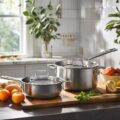Introduction to the Perfect Egg Frying Pan
When it comes to making the perfect fried egg, the type of pan you use can make all the difference. A good frying pan ensures even cooking, minimizes sticking, and makes flipping eggs a breeze. In this guide, we will explore the key features to look for in an egg frying pan, different types of pans available, and tips for maintaining your pan to achieve that perfect fried egg every time.
Key Features of an Ideal Egg Frying Pan
Here are some essential features to consider when choosing an egg frying pan:
- Non-stick surface: A non-stick coating prevents eggs from sticking to the pan, making cooking and cleanup easier.
- Even heat distribution: Look for pans that distribute heat evenly to avoid hot spots and ensure uniform cooking.
- Size and shape: A pan with slightly sloped sides and a flat bottom is ideal for frying eggs.
- Durability: Choose a pan made from durable materials like stainless steel or cast iron that can withstand high temperatures and frequent use.
- Handle design: A comfortable, heat-resistant handle is essential for safe and easy maneuvering of the pan.
Types of Egg Frying Pans
There are several types of frying pans to choose from, each with its own set of advantages:
- Non-stick pans: Made with a non-stick coating, these pans are perfect for frying eggs without the need for excessive oil or butter. They are easy to clean and are available in various materials, such as aluminum or ceramic.
- Cast iron pans: Known for their excellent heat retention and even cooking, cast iron pans require proper seasoning but offer a naturally non-stick surface over time. They are highly durable and can last for generations.
- Stainless steel pans: These pans are highly durable and resistant to rust and corrosion. While they may not be naturally non-stick, they offer excellent heat distribution and can be used at high temperatures.
- Copper pans: Copper pans provide quick and even heat distribution, making them ideal for precise cooking. They often come with a stainless steel or tin lining to prevent reactions with food.
- Ceramic pans: These non-stick pans are made with a ceramic coating that is free from harmful chemicals. They offer a smooth cooking surface and are ideal for health-conscious cooks.
Maintaining Your Egg Frying Pan
Proper maintenance of your frying pan can extend its lifespan and ensure consistent performance. Here are some tips for keeping your pan in top condition:
- Cleaning: Always follow the manufacturer’s instructions for cleaning your pan. For non-stick pans, avoid using abrasive scrubbers or harsh detergents. For cast iron pans, clean with hot water and a stiff brush, and avoid soap to preserve the seasoning.
- Seasoning: Cast iron and some carbon steel pans require regular seasoning to maintain their non-stick properties. Apply a thin layer of oil and heat the pan to create a protective layer.
- Storage: Store your pans in a dry place to prevent rust and damage. Use pan protectors or paper towels between stacked pans to avoid scratches.
- Using the right utensils: Use wooden, silicone, or plastic utensils to prevent damaging the non-stick coating.
Tips for Frying the Perfect Egg
Now that you have the right pan, here are some tips to achieve the perfect fried egg:
- Preheat the pan: Ensure your pan is adequately preheated before adding oil or butter. This helps prevent the egg from sticking.
- Use the right amount of oil or butter: A small amount of oil or butter creates a barrier between the egg and the pan, making flipping easier.
- Cook on medium heat: Cooking on medium heat ensures the egg whites set without overcooking the yolk.
- Cover the pan: Covering the pan with a lid for a short period helps the egg whites cook evenly while keeping the yolk runny.
- Seasoning: Add a pinch of salt and pepper for flavor. You can also experiment with herbs and spices for a unique twist.
Frequently Asked Questions (FAQ)
1. What is the best material for an egg frying pan?
Non-stick pans are generally the best choice for frying eggs due to their easy-release surface. However, cast iron and well-maintained stainless steel pans can also be excellent options.
2. How do I prevent eggs from sticking to the pan?
Ensure your pan is preheated, use a small amount of oil or butter, and cook on medium heat. Non-stick pans are particularly effective at preventing sticking.
3. Can I use metal utensils on a non-stick pan?
It is best to avoid metal utensils on non-stick pans as they can damage the coating. Use wooden, silicone, or plastic utensils instead.
4. How often should I season my cast iron pan?
Season your cast iron pan regularly, especially after each use. Apply a thin layer of oil and heat the pan to maintain its non-stick surface.
5. What is the ideal temperature for frying eggs?
Medium heat is ideal for frying eggs. It ensures the egg whites cook evenly without overcooking the yolk.









